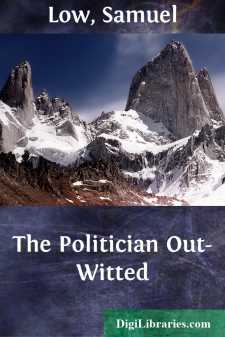Categories
- Antiques & Collectibles 13
- Architecture 36
- Art 48
- Bibles 22
- Biography & Autobiography 813
- Body, Mind & Spirit 142
- Business & Economics 28
- Children's Books 17
- Children's Fiction 14
- Computers 4
- Cooking 94
- Crafts & Hobbies 4
- Drama 346
- Education 46
- Family & Relationships 57
- Fiction 11829
- Games 19
- Gardening 17
- Health & Fitness 34
- History 1377
- House & Home 1
- Humor 147
- Juvenile Fiction 1873
- Juvenile Nonfiction 202
- Language Arts & Disciplines 88
- Law 16
- Literary Collections 686
- Literary Criticism 179
- Mathematics 13
- Medical 41
- Music 40
- Nature 179
- Non-Classifiable 1768
- Performing Arts 7
- Periodicals 1453
- Philosophy 64
- Photography 2
- Poetry 896
- Political Science 203
- Psychology 42
- Reference 154
- Religion 513
- Science 126
- Self-Help 84
- Social Science 81
- Sports & Recreation 34
- Study Aids 3
- Technology & Engineering 59
- Transportation 23
- Travel 463
- True Crime 29
The Politician Out-Witted
by: Samuel Low
Description:
Excerpt
Very little is known about the author of "The Politician Out-witted," a play which I have selected as representative of the efforts of the American drama, as early as 1789, to reflect the political spirit of the time. Assiduous search on the part of the present editor has failed to bring to light any information from any of the historical societies regarding Mr. Low, except that he was born on December 12, 1765, and that he must have been, in his political sympathies, an anti-federalist. The reader who is interested in literary comparisons might take this play of Low's and read it in connection with Dunlap's "The Father," in which a prologue gives a very excellent example of the American spirit. Dunlap's "Darby's Return" might likewise be read in connection with "The Politician Out-witted," inasmuch as it refers to the Federal Constitution, and to Washington's inauguration.
The present play, which was opposed to the Federal union, was, according to some authorities, offered to the actors, Hallam and Henry, and was promptly rejected by them. There is no record of the piece having thereafter succeeded in reaching the theatre. It is mentioned both in Dunlap and in Seilhamer in a casual manner.
In the New York Directory, of 1794, we find Samuel Low mentioned as a clerk in the Treasury Department, and, in a later Directory of 1797-1798, he is referred to as the first bookkeeper in the Bank of New York.
In the preface to his published poems, after the diffident manner of the time, Low says: "Many of the pieces were written at a very early age, and most of them under singular disadvantages; among which, application to public business, for many years past, was not the least; not only because it allowed little leisure for literary pursuits, but because it is of a nature peculiarly inimical to the cultivation of poetic talent. For his own amusement and improvement he has written—at the request of his friends he publishes."
We know that he was a writer of odes, exhibiting some grace in his handling of this poetic form. He is also credited with having written a long poem entitled "Winter Displayed," in 1794. In 1800, two volumes of poems appeared in New York, and among the subscribers listed were John Jacob Astor, William Dunlap, Philip Hone, Dr. Peter Irving, and members of the Beekman and Schermerhorn families. Examining the contents of these volumes, one discovers that Samuel Low, in a social and fraternal way, must have been a very active member of New York society. On January 8, 1800, his "Ode on the Death of Washington" was recited by Hodgkinson at the New York Theatre.
At St. Paul's Church, and at Trinity Church, his anthems and odes were ever to the fore. He must have been a member of the Tammany Society, or Columbian Order, because a "Hymn to Liberty" was penned by him, and sung in church on the anniversary of that organization, May 12, 1790.
His Masonic interests are indicated throughout the volume by poems written especially for such orders as the Holland Lodge, and the Washington Chapter of Royal Arch Masons. He was also asked to write an epitaph on John Frederick Roorbach.
His interest in politics may likewise be seen in several poems written about the Constitution of the United States; while his literary taste may be measured by his tribute to Kotzebue, the "second Shakespeare," in which occur the lines:
"The purest, sweetest among modern bardsWho tread the difficult dramatic path."
Except for this, as one of the biographical sources says, nothing is known of Low's history, "and he is only saved from absolute oblivion by his two small volumes of poems."
Yet "The Politician Out-witted" has historical value, and, in its dialogue, exhibits how well Low had studied the artificial comedy of Sheridan. The construction of the plot is mechanical, but the convictions of the two opposing fathers, on the subject of the Constitution, give the play an interest in character and in viewpoint which is marked....


